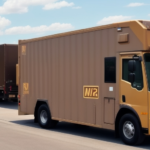Understanding UPS Commercial Rates and Shipping Estimates
If you run a business that requires shipping products, you're likely aware of the importance of accurate shipping estimates and reducing shipping costs. UPS, one of the world's leading package delivery companies, offers a variety of commercial rates and shipping services to help businesses manage their shipping needs efficiently. This article explores the different types of UPS commercial rates, the factors affecting them, and how to calculate them for your business. We will also discuss tips for negotiating better rates, selecting the right shipping service, obtaining accurate shipping estimates with UPS, and avoiding common mistakes in estimating shipping costs. Additionally, we will cover carrier liability and insurance options available with UPS.
What Are UPS Commercial Rates and Why Are They Important?
UPS commercial rates are shipping rates specifically designed for businesses that ship large volumes of packages. Unlike regular shipping rates, commercial rates offer businesses more competitive pricing options, which can significantly impact a company's bottom line. By choosing the appropriate commercial rate, businesses can reduce shipping costs, thereby increasing profitability.
Statistics from Statista indicate that shipping costs can account for up to 40% of total business expenses. Utilizing UPS commercial rates can help mitigate these costs effectively.
In addition to cost savings, UPS commercial rates often include additional services such as enhanced package tracking, insurance, and potentially faster delivery times. These services provide businesses with greater security and reliability, ensuring that packages are monitored and protected throughout transit.
Understanding the various types of UPS commercial rates and selecting the one that best fits your shipping needs is crucial. Factors such as package weight, destination, and delivery time frame all influence the cost of shipping. Collaborating with a UPS representative can help determine the most cost-effective and efficient shipping options tailored to your business requirements.
How Do UPS Commercial Rates Differ from Regular Shipping Rates?
Regular shipping rates are typically set for individual package shipments and are based on factors like weight, distance, and package dimensions. In contrast, commercial rates are designed for businesses that consistently ship large volumes of packages. These rates are often negotiated based on a company's shipping volume, frequency, and delivery patterns, allowing for more customized and cost-effective pricing.
Commercial rates also include additional services such as package tracking, customs clearance for international shipments, and signature verification, which may not be available with regular shipping rates. This comprehensive service package enhances the reliability and security of shipments for businesses.
The pricing structure of commercial rates is more flexible compared to regular rates. Businesses can negotiate rates that reflect their specific shipping needs, leading to significant savings, especially for those with high shipping volumes.
Factors That Affect UPS Commercial Rates
- Shipper Location: The origin of the shipment can influence rates due to varying regional costs.
- Package Size and Weight: Heavier and larger packages incur higher shipping costs.
- Destination: International shipments are subject to additional fees like customs duties and tariffs.
- Delivery Speed: Expedited shipping options such as next-day delivery are more expensive.
- Shipping Volume: Higher shipping volumes can qualify businesses for significant volume discounts.
- Fuel Costs: Fluctuations in fuel prices can affect overall shipping rates.
Additionally, insurance coverage level chosen by the business can impact shipping costs. While basic carrier liability is included, purchasing additional insurance provides greater protection for high-value shipments but at an increased cost.
Businesses requiring real-time tracking and visibility for their shipments may also incur additional fees for these premium services.
UPS offers a range of shipping options, including ground, air, and international services, each with its own set of rates and fees. For example, expedited air shipping is costlier than ground shipping but offers faster delivery times, which might be essential for time-sensitive shipments.
How to Calculate UPS Commercial Rates for Your Business
Calculating UPS commercial rates involves providing specific information about your shipments, including shipping volume, package dimensions, weight, delivery speed, and destination. UPS offers online tools and rate calculators to help businesses estimate their shipping costs accurately.
For instance, the UPS Rate Calculator allows businesses to input their shipping details and receive an estimated cost based on current rates.
It's important to consider the type of business when calculating rates. Shipping hazardous materials or international shipments may involve additional fees and require compliance with specific regulations.
The level of service required also affects the rate. UPS offers various delivery options, from standard ground shipping to expedited air services. Choosing faster delivery options generally results in higher costs, but it may be necessary to meet customer expectations and maintain competitiveness.
Tips for Negotiating Better UPS Commercial Rates
- Demonstrate Shipping Volume: Highlighting your business's shipping volume and consistent patterns can help negotiate better rates with UPS.
- Bundle Shipping Services: Combining different shipping services, such as domestic and international, can lead to more favorable pricing.
- Explore Alternative Shipping Options: Services like UPS SurePost offer cost-effective solutions for lightweight packages by leveraging the postal service for final delivery.
- Leverage Vendor Relationships: Bundling UPS shipping with other services, such as third-party logistics providers (3PL), can provide additional negotiation leverage and cost savings.
By implementing these strategies, businesses can secure more competitive commercial rates, ultimately reducing shipping costs and enhancing profitability.
Choosing the Right UPS Shipping Service for Your Business Needs
UPS offers a broad spectrum of shipping services tailored to meet different business needs, including ground, air, and international shipping options. The right choice depends on factors such as delivery timeframes, package size and weight, and destination specifics.
Utilizing UPS's online comparison tools can help businesses assess various shipping services against their requirements and budget constraints. This ensures that businesses select the most efficient and cost-effective shipping solutions.
Understanding the Different Types of UPS Shipping Services Available
UPS provides numerous shipping services to accommodate businesses of all sizes:
- UPS Ground: Ideal for businesses with less urgent shipping needs, offering reliable delivery within 1-5 business days based on distance.
- UPS Next Day Air: The fastest UPS service, guaranteeing delivery by the next business day, suitable for urgent shipments.
- UPS 2nd Day Air: Provides delivery within two business days, balancing speed and cost.
- UPS Worldwide Express: A premium international service offering guaranteed delivery to over 220 countries and territories, complete with customs clearance and real-time tracking.
- UPS 3 Day Select: Offers reliable delivery within three business days, suitable for non-urgent domestic shipments at a lower cost.
Each service comes with its own set of delivery options, shipping speeds, and pricing structures, allowing businesses to choose the best fit based on their specific needs.
Comparing UPS Shipping Services: Which One is Right for You?
When evaluating UPS shipping services, businesses should consider several factors:
- Delivery Time: Determine how quickly your shipments need to reach their destination.
- Package Size and Weight: Heavier and larger packages may be more cost-effective with certain services.
- Destination: International shipments may require different services compared to domestic ones.
- Tracking and Additional Services: Enhanced tracking, insurance, and other services may be necessary for valuable or sensitive shipments.
- Environmental Impact: Consider eco-friendly shipping options to reduce your carbon footprint. UPS offers services like carbon-neutral shipping and options that minimize unnecessary trips.
By assessing these factors, businesses can identify the most suitable and cost-effective UPS shipping service aligned with their operational needs.
Moreover, environmentally responsible shipping choices not only contribute to sustainability but can also enhance your business's reputation among eco-conscious consumers.
How to Get Accurate Shipping Estimates with UPS
UPS provides several online tools to help businesses obtain accurate shipping estimates:
- UPS Rate Calculator: Enter details such as package dimensions, weight, destination, and desired delivery speed to receive an estimated cost.
- Shipping Tools: Utilize UPS's suite of shipping tools available on their website to compare different shipping options and their associated costs.
Providing accurate information is crucial for obtaining reliable estimates. Ensure that package details are correct, including dimensions and weight, to avoid discrepancies in shipping costs.
For businesses shipping internationally, additional information such as customs documentation and potential tariffs should be considered to obtain a comprehensive shipping estimate.
Common Mistakes to Avoid When Estimating UPS Shipping Costs
Accurate shipping cost estimation is essential for budgeting and maintaining profitability. Common mistakes businesses should avoid include:
- Incorrect Package Weight and Size: Misreporting dimensions and weight can lead to inaccurate estimates and unexpected costs.
- Incorrect Delivery Destination: Ensuring the delivery address is accurate helps prevent delays and additional fees.
- Omitting Additional Services and Fees: Failing to account for extras like insurance, tracking, and signature confirmation can result in higher than expected shipping costs.
By avoiding these pitfalls, businesses can ensure their shipping cost estimates are as accurate as possible, facilitating better financial planning and customer satisfaction.
Best Practices for Managing Your Business’s Shipping Costs with UPS
Effective management of shipping costs can lead to substantial savings. Here are some best practices:
- Negotiate Better Rates: Engage with UPS to negotiate rates based on your shipping volume and patterns.
- Bundle Shipping Services: Combine multiple shipping services to leverage better pricing.
- Optimize Package Weight and Size: Use appropriately sized packaging to minimize weight and dimensional charges.
- Utilize Online Tools: Compare different shipping options using UPS’s online tools to find the most cost-effective solutions.
- Regularly Review Shipping Patterns: Analyze your shipping data periodically to identify areas for cost reduction.
Implementing these strategies can help businesses streamline their shipping operations, reduce costs, and improve overall efficiency.
Understanding Carrier Liability and Insurance Options with UPS
UPS provides various carrier liability and insurance options to protect businesses against lost or damaged packages during transit:
- Carrier Liability: UPS includes basic carrier liability in their shipping rates, which may not cover the full value of high-value items.
- Additional Insurance: Businesses can purchase additional insurance coverage to fully protect their shipments. This is particularly important for valuable or fragile items.
It's essential for businesses to assess their insurance needs carefully. For high-value shipments, opting for additional insurance is advisable to ensure comprehensive coverage.
For more information on UPS's insurance options, businesses can refer to the UPS Insurance Guide available on ShipScience.



















